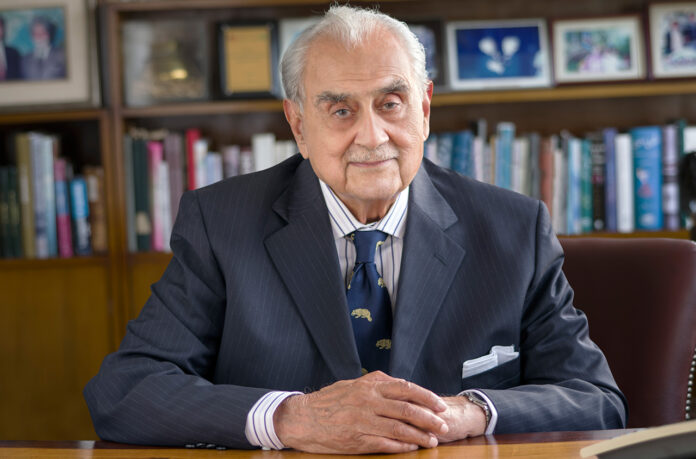Just how well did IGI Holdings do last year? The parent company of all the IGI companies, had a surprisingly great year. The pandemic has dented larger companies than IGI, and yet the company remained relatively unscathed – at least according to the latest financial statement for the year ending December 31, 2020, released to the Pakistan Stock Exchange on March 19.
If one looks at the company on a standalone basis, the company’s net income stood at Rs944 million, compared to 2019’s Rs896 million. And the results are even better when one looks at the consolidated income statement: the company’s operating revenue jumped from Rs9.9 billion in 2019, to Rs11.5 billion in 2020. This led to a sharp rise in net income (as all other expenses stayed relatively the same). In fact, net income in 2020 stood at more than double that of the previous year at Rs1.7 billion, compared to just Rs650 million before. And this had an impact elsewhere as well: the earnings per share for the company shot up from just Rs4.8 in 2019, to Rs12.1 in 2020.
To place this in context, it helps to understand a little about the company itself.
IGI Holdings may itself only be a few years old, but it is part of a much older legacy of businesses that predate independence. The family patriarch, Sir Syed Maratib Ali, was a highly successful entrepreneur in the early part of the twentieth century and made his fortune supplying a variety of goods to the British government in India, specifically the British Indian Army.
Maratib had three sons, Amjad, Wajid, and Babar. Amjad, the eldest, went into politics and became Pakistan’s ambassador to the US in the 1950s and the United Nations in the 1960s. Wajid and Babar decided to stay in the family business. The Packages Group is essentially the ‘Babar Ali’ branch of the family, while the Treet Group is the ‘Wajid Ali’ branch.
Babar Ali is responsible for many things. He created and grew Packages Ltd, Milkpak Ltd, Tri-pack Films, and the IGI Group. He brought several foreign companies to Pakistan, including Nestle (Switzerland), Tetrapak (Sweden) and serves on the board of Coca Cola Pakistan, Siemens Pakistan, and Sanofi-Aventis. He is also the founder of the Lahore University of Management Sciences (LUMS).
The IGI Group is a relatively lesser known venture by Syed Babar Ali, compared to the others. The first company in the IGI Group was IGI Insurance, the property and casualty insurance company, which was founded in 1953 and is currently the fourth-largest property and casualty insurance company in the country.
IGI Investment Bank was the next entity created by the group, founded in 1990 as the group’s first financial services foray outside insurance. Shortly after creating the investment bank, IGI bought themselves a seat on the Karachi Stock Exchange and set up IGI Securities (now called IGI Finex Securities) in 1994. IGI Investment Bank did own a securities brokerage licence as well, but in 2007, IGI Securities became a subsidiary of IGI Investment Bank and the two securities licenses were merged into IGI Securities.
In 2007, the group further deepened its foray into the capital markets and created IGI Funds, an investment management company that offered mutual funds to retail and institutional investors. IGI Funds was a subsidiary of IGI Investment Bank. However, in 2013, IGI agreed to sell its asset management business to Bank Alfalah’s subsidiary, Alfalah GHP Investment Management Ltd, for Rs200 million. The reason? A need to raise cash for the struggling parent company, IGI Investment Bank. It was of no use, and in 2016, the Securities and Exchanges Commission of Pakistan (SECP) ordered the group to wind down the operations of IGI Investment Bank and merge its remaining assets into IGI Insurance in late 2016.
Then in late 2016,IGI Insurance announced that it would be renaming itself IGI Holdings and consolidating the IGI Group’s insurance and financial services companies under a single umbrella.
Today, this group has four subsidiaries, IGI Finex Securities Limited, IGI General Insurance Limited, and IGI Investments (which are wholly-owned), and IGI Life Insurance Limited (where the parent company owns 82.69%).
This new entity is a behemoth. Look at the graph for total assets included with this story, and it will show you that IGI Insurance total assets never crossed the Rs50 billion mark, at its peak. Meanwhile at the end of its first full year of operations in 2017, IGI Holdings had a consolidated balance sheet with assets worth Rs103 billion. This remained at Rs86 billion in 2018, and Rs84 billion in 2019. That giant asset value fuelled rumours that IGI was a formidable company with the ability to buy a substantial asset – such a bank.
This did not materialize and yet others said the merger was simply for tax reasons. Either way, the restructuring has finally paid off. After Rs968 million in net income in 2018, and just Rs650 million in 2019, net income in 2020 stood at ar Rs1.7 billion – comparable to IGI Insurance profits from the early 2010s.
























